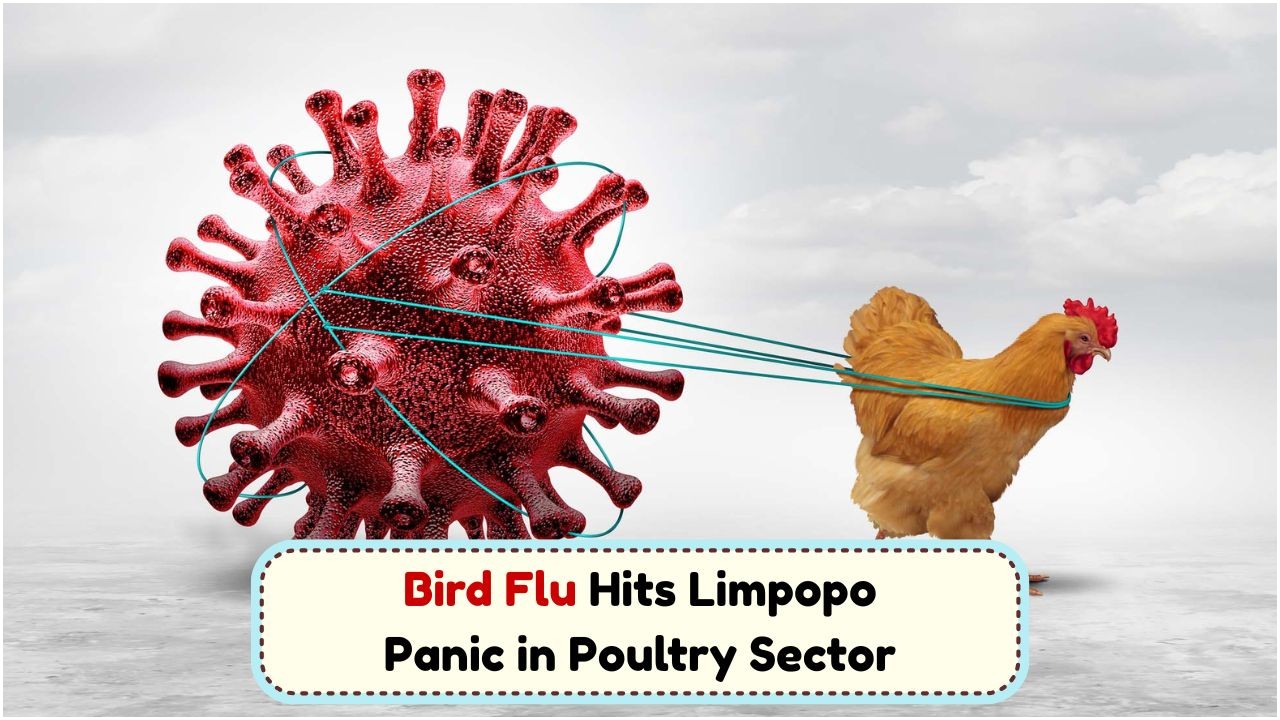Limpopo Bird Flu Outbreak: The poultry industry in Limpopo is currently grappling with a severe crisis as a virulent bird flu outbreak escalated in July. This outbreak has not only affected local poultry farmers but also raised concerns about food security in the region. The disease, highly contagious among birds, poses a significant threat to the livelihoods of many South Africans who depend on poultry farming. As the government and health officials work tirelessly to contain the spread, the economic impact is becoming increasingly evident. Farmers are experiencing substantial losses, and there is growing apprehension about potential job losses in the sector.
Impact of Bird Flu on Limpopo’s Poultry Farmers
The bird flu outbreak in Limpopo has had devastating effects on the region’s poultry farmers. Many have been forced to cull large numbers of birds to prevent further spread of the disease, resulting in significant financial losses. The cost of production has soared, while market prices have plummeted due to decreased demand and consumer fears. Farmers are struggling to cope with the dual burden of increased expenses and reduced income. This situation is further exacerbated by the need to implement stringent biosecurity measures, which require additional resources and manpower.
- The outbreak has led to the culling of thousands of birds.
- Farmers face increased production costs and lower market prices.
- Biosecurity measures demand additional resources.
- There is a potential risk of widespread job losses in the poultry sector.
- The outbreak could affect regional food security if not contained promptly.
Government’s Response to the Limpopo Bird Flu Crisis
The South African government has swiftly responded to the bird flu crisis in Limpopo with a series of measures aimed at controlling the outbreak. The Department of Agriculture, Forestry, and Fisheries has enforced strict quarantine zones and is working closely with veterinary services to monitor and manage affected areas. There is an ongoing effort to provide farmers with the necessary support to mitigate their losses and implement effective biosecurity protocols. Coordination with international bodies is also underway to ensure that all actions align with global standards for disease control.
| Government Measure | Description | Objective | Outcome |
|---|---|---|---|
| Quarantine Zones | Restricting movement of birds in affected areas | Control spread of disease | Reduced transmission rates |
| Veterinary Support | Providing expertise and resources to farmers | Assist in disease management | Improved outbreak control |
| Financial Aid | Support for affected farmers | Alleviate financial burden | Stabilized farmer income |
| International Coordination | Working with global health organizations | Ensure compliance with standards | Enhanced control measures |
Economic Implications of the Bird Flu Outbreak in Limpopo
The economic ramifications of the bird flu outbreak in Limpopo are profound, affecting not just the poultry industry but also the broader regional economy. Poultry farming is a significant contributor to Limpopo’s economy, and the outbreak threatens to derail progress in this sector. The losses incurred by farmers have a ripple effect, impacting suppliers, transporters, and retailers within the supply chain. Additionally, the fear of a sustained outbreak could deter future investments in the region, further stalling economic growth.
- Loss of revenue for poultry farmers and related industries.
- Decreased consumer confidence in poultry products.
- Potential for increased unemployment rates in affected areas.
- Negative impact on regional economic growth and development.
- Challenges in maintaining food security and stable supply chains.
Preventive Measures and Future Strategies
To prevent future outbreaks and mitigate their impact, it is crucial to establish robust preventive measures and long-term strategies. This includes enhancing surveillance systems to detect early signs of the disease, promoting research into more effective vaccines, and fostering collaboration between government, farmers, and researchers. Education and training programs for farmers on biosecurity practices could also help reduce the risk of transmission. By investing in these areas, Limpopo can build a more resilient poultry industry capable of withstanding future challenges.
- Strengthen surveillance systems for early disease detection.
- Invest in research for effective vaccines and treatments.
- Promote education and training on biosecurity practices.
- Encourage collaboration among stakeholders in the poultry sector.
Frequently Asked Questions About the Limpopo Bird Flu Outbreak
The Limpopo bird flu outbreak has raised several questions and concerns. Here are some of the most commonly asked questions:
- What is bird flu? Bird flu, or avian influenza, is a viral infection that spreads among birds and can affect humans and other animals.
- How does bird flu spread? The virus spreads through direct contact with infected birds, contaminated surfaces, and sometimes through the air.
- What are the symptoms of bird flu in birds? Symptoms include sudden death, respiratory distress, and decreased egg production.
- Can humans contract bird flu? While rare, humans can contract bird flu through close contact with infected birds.
Table: Impact of Bird Flu on Various Sectors
| Sector | Impact | Response |
|---|---|---|
| Poultry Farming | Severe losses and culling of flocks | Implementation of biosecurity measures |
| Retail | Decreased demand for poultry products | Marketing campaigns to restore confidence |
| Transport | Disruption in supply chains | Enhanced logistics management |
| Economy | Potential slowdown in growth | Government interventions and aid |
| Health | Risk of transmission to humans | Public health advisories and monitoring |
Key Takeaways from the Limpopo Bird Flu Outbreak
The Limpopo bird flu outbreak serves as a critical reminder of the importance of vigilance and preparedness in managing animal diseases. The rapid response by the government and stakeholders has been instrumental in controlling the spread, but there is still much work to be done. Strengthening biosecurity measures and investing in research and development are crucial steps in ensuring the resilience of the poultry industry. Continued collaboration and education will pave the way for a more robust approach to handling future challenges.
 August 2025: South Africa's Greylist Exit Sparks Predictions of 22% Surge in Incoming Capital
August 2025: South Africa's Greylist Exit Sparks Predictions of 22% Surge in Incoming Capital
- Vigilance and preparedness are key in managing outbreaks.
- Government response plays a crucial role in outbreak control.
- Biosecurity measures are essential for prevention.
- Research and development are vital for long-term resilience.
Looking Ahead: Towards a Resilient Poultry Industry
The future of Limpopo’s poultry industry depends on the lessons learned from this outbreak. By focusing on building resilience and fostering innovation, Limpopo can transform this crisis into an opportunity for growth and development. Embracing technology, improving infrastructure, and enhancing collaboration among stakeholders will be pivotal in creating a sustainable and thriving poultry sector. With the right strategies in place, Limpopo can emerge stronger and better equipped to face future challenges.
- Focus on building resilience and fostering innovation.
- Embrace technology and improve infrastructure.
- Enhance collaboration among stakeholders.
- Create a sustainable and thriving poultry sector.









